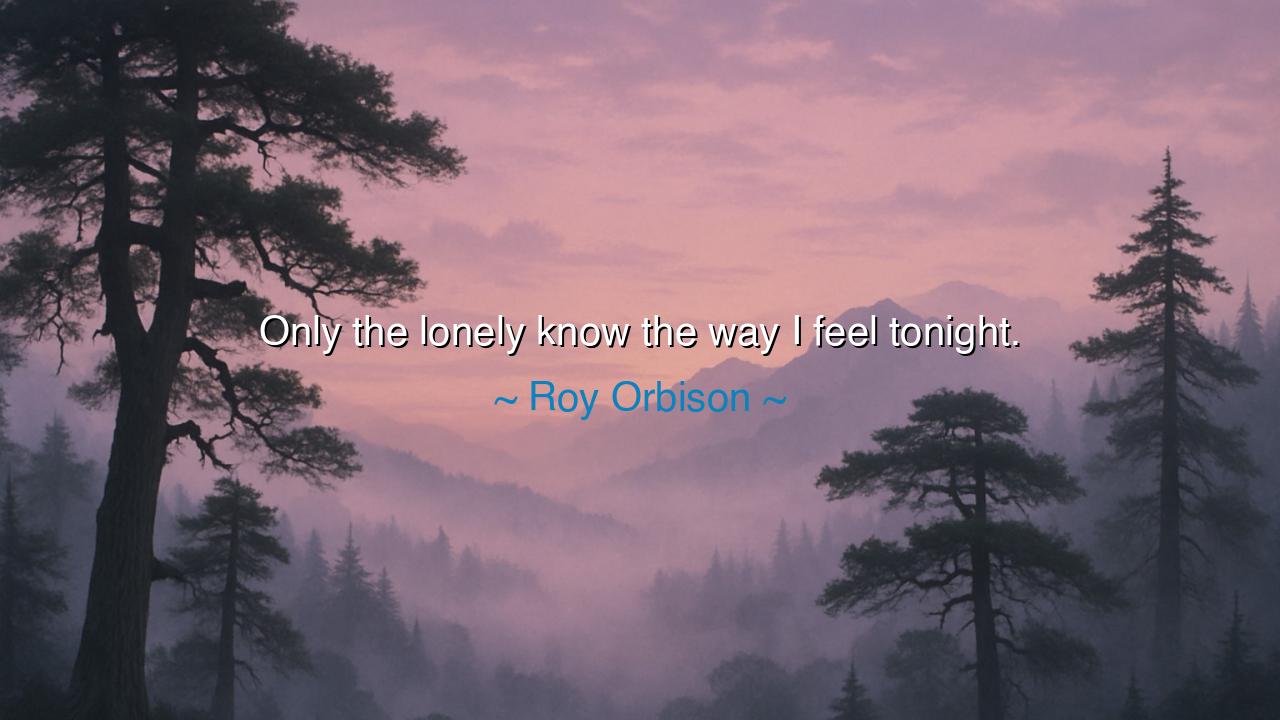
Only the lonely know the way I feel tonight.






"Only the lonely know the way I feel tonight." These poignant words from Roy Orbison strike at the heart of the human experience—loneliness. There are few emotions as universal, yet as isolating, as being alone in the world, disconnected from those around us. Orbison’s reflection captures the deep, aching truth that loneliness is a feeling that can only be fully understood by those who have experienced it. It is not something easily communicated or shared; it resides in a space of profound solitude where the mind and heart become aware of the absence of companionship, and the soul feels the weight of an empty void.
In the ancient world, the great philosophers often reflected on the nature of human suffering, and many recognized that loneliness is not just a physical absence, but a deep spiritual isolation. Aristotle, in his exploration of the ideal life, spoke of friendship as one of the highest goods, emphasizing that companionship was a key to the flourishing of the soul. Yet, even he acknowledged that solitude is sometimes necessary for self-reflection and growth. He understood that while companionship could bring joy, loneliness could bring insight, forcing us to confront our deepest fears and desires. In this sense, the loneliness that Orbison sings about may also be a reflection of the soul’s search for meaning in a world that often fails to provide the deep connections we yearn for.
The notion of loneliness as an existential experience is echoed by the Stoics, such as Epictetus, who believed that all humans are ultimately alone in their struggles. Though we may have friends, family, or companions, the emotional journey is ours to navigate. Epictetus teaches that the key to overcoming such isolation is not to seek external validation, but to cultivate inner strength and self-reliance. However, the loneliness Orbison describes is not simply an emotional weakness or an opportunity for growth—it is a raw, visceral experience that reflects a deeper, often painful truth about the human condition: that we all face our darkest moments alone.
Consider the life of Vincent van Gogh, the great artist whose works are celebrated worldwide. Van Gogh’s loneliness was not merely a result of being isolated from others, but from being misunderstood. Despite his extraordinary talent, he lived much of his life in solitude, driven by his intense desire to express the beauty he saw in the world, yet unable to connect with those around him. His letters often expressed the intense isolation he felt, even while surrounded by family, friends, and admirers. His suffering was a loneliness of the soul, a sense that no one truly understood his inner turmoil. Like Orbison’s song, van Gogh’s loneliness was an experience that could only be truly understood by those who had felt the same—those who have walked in the silence of their own hearts, carrying the weight of their inner battles.
Orbison’s line also captures the alienation that comes with love lost. The pain of longing for someone who is absent, or feeling disconnected from a loved one, is a loneliness that can be uniquely heartbreaking. Romeo and Juliet, though surrounded by others in their story, were ultimately isolated in their love. Their tragedy is built on a misunderstanding of their desires, and in the final moments, their isolation from the world leads to the destruction of their love. Similarly, Orbison’s lyrics reflect the sorrow of unrequited love—the feeling of being emotionally abandoned, despite the presence of others in one’s life. Only the lonely, those who have loved deeply and lost, know the profound ache of that emptiness.
The lesson here is clear: loneliness is not a state that can always be avoided, but it is a space in which we can discover the depth of our own emotional landscape. As humans, we will experience moments of isolation, whether through the loss of a loved one, the disconnection from society, or the recognition that our journey through life is uniquely our own. Orbison’s words remind us that loneliness is not just a temporary emotion but a reflection of the human condition—an experience that, when understood, can lead to profound self-awareness and understanding of the shared struggles that unite us all.
In practical terms, we must learn to navigate loneliness with grace. Instead of viewing it solely as an affliction, we can approach it as an opportunity for self-reflection and growth. Meditation, journaling, and creative expression can all be tools that allow us to transform loneliness into understanding, using our solitude to reflect on what truly matters in life. Rather than filling our emptiness with distractions or seeking superficial connections, we can use loneliness as a space to explore our deepest desires, our fears, and the truths that shape our existence.
In conclusion, Roy Orbison’s hauntingly beautiful reflection on loneliness speaks to a universal truth: that while loneliness may feel isolating, it is also a shared experience among all who have loved, lost, and searched for meaning in a world that often seems indifferent to their struggles. The ancients, from Aristotle to Socrates, recognized the deep connection between loneliness and self-discovery, and Orbison’s words echo that wisdom. Let us embrace the solitude that comes with loneliness, knowing that in those moments, we may find our truest selves and the strength to move forward. For, as the lonely know, it is in solitude that we may discover the depth of our own souls.






AAdministratorAdministrator
Welcome, honored guests. Please leave a comment, we will respond soon